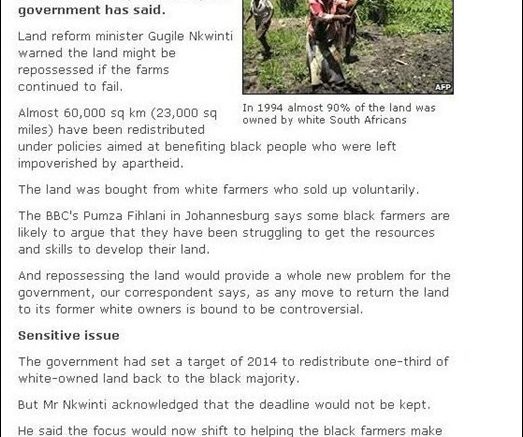May 22 2017 14:49 Leanne George and Johan Eybers, Netwerk24

Cape Town – While the ANC increasingly hints at land expropriation without compensation, the state is struggling to transfer more than 4 000 farms which have already been bought to their new owners, Fin24’s sister publication Netwerk24 reported.
The Land Claims Commissioner blames the delay on disputes among land claimants.
Roelf Meyer, former politician and director of non-profit organisation In Transformation Initiative (ITI), said its research division shows government owns 4 323 farming units, which include smallholdings and bigger farms. This land was bought following successful land claims against these properties. However, the farms have never been transferred to their new owners.
According to Meyer, it doesn’t make sense to expropriate more farms if government does not have the capacity to transfer the farms already bought to future farmers.
‘It’s not our fault’
Nomfundo Gobodo, chief land claims commissioner, told Fin24’s sister publication on Friday that the department of rural development and land reform cannot be blamed for the delay in the transfer of title deeds.
READ: Simply seizing land could make SA a second Zim – analyst
According to Gobodo, claimants or the tribes who become beneficiaries start disputing ownership among one another as soon as the land claim has been concluded.
Legislation states that the beneficiaries of a land claim need to establish a community property association to manage the land. When there is a dispute among the beneficiaries, the process is often delayed.
The department is unable to transfer title deeds when beneficiaries institute legal proceedings and when a land management association hasn’t been established yet, Gobodo said.
Meyer, however, claimed that the disputes don’t explain all the delays.
Freedom Front Plus leader Pieter Groenewald on Friday said in Parliament that only one in 10 title deeds bought for land reform has been transferred to new owners. He claimed 90% of the title deeds remain in the hands of government.
“The state owns this land. Why doesn’t government transfer this land to their new owners? It’s not done because it fits the ANC’s political agenda,” Groenewald said.
An example of failure
Democratic Alliance (DA) Member of Parliament Ken Roberts, who represents his party on the portfolio committee on rural development and land reform, said the Somhlolo Trust in Mpumalanga is an example of the ANC’s failed land reform efforts.
The trust, which is the beneficiary of a land restitution project, has not received “a cent”. Government bought 17 farms to transfer to the trust.
READ: Give black farmers title deeds – department
“They have also not received title deeds and have no say in the property’s money matters,” Robertson said.
“Can you imagine their frustration?”
Thomas Walters, DA spokesperson on rural development and land reform, told Rapport that the bottlenecks are caused by budgetary and personnel constraints in the department.
“There are only a few officials who need to deal with an enormous number of land claims and this presents an opportunity for corruption,” Walters said, adding that it’s a complex process to investigate the validity of land claims.
In the first instance, a number of people can lay claim to a single piece of land and it takes time to conclude the research on who the rightful claimant is.
READ: Push for land seizures gains support of top ANC man
In addition, people can claim right of abode on the land, which could complicate the process even more.
The ITI’s Meyer said the department is unable to deal with land reform on its own.
“For this reason ITI, in collaboration with other stakeholders, is developing a coordinating mechanism to make these farms available to prospective farmers,” he said.
READ: New bill will set out unique land ceilings
The Land Bank has agreed to provide funding as well as training and advice to commercial farmers, Meyer said. The ITI will soon make an announcement to this effect.
Audit completed
Rural Development and Land Reform Minister Gugile Nkwinti told Parliament on Friday that the second phase of the national land audit, which includes land ownership on the basis of race and gender, has been concluded and presented to Cabinet.
The first phase that was completed in 2014 showed that 22% of land is owned by government, while 78% is owned privately.
http://www.fin24.com/Companies/Agribusiness/govt-sits-on-4-000-farms-yet-hints-at-expropriation-20170522

